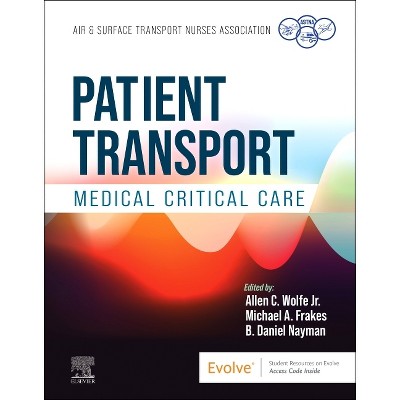Sponsored

Mechanical Ventilation in Critical Care Transport - by Susan R Wilcox & Jason Cohen & Michael Frakes (Hardcover)
In Stock
Sponsored
About this item
Highlights
- This book focuses on managing mechanical ventilation and its impact on physiology, primarily in the transport environment.
- About the Author: Susan R. Wilcox MD, FCCM Department of Emergency Medicine Massachusetts General Hospital Harvard Medical School Boston, MA USA Jason Cohen DO, FACEP, FCCM, FAEMS Boston MedFlight Bedford, MA USA Michael Frakes APRN, NEA-BC, FCCM, FAEN, FACHE Brigham and Women's Hospital Boston MedFlight Massachusetts USA
- 195 Pages
- Medical, Emergency Medicine
Description
Book Synopsis
This book focuses on managing mechanical ventilation and its impact on physiology, primarily in the transport environment. Mechanical ventilation is one of the most common procedures in all critical care, including critical care transport. Yet the management of ventilation poses significant risks to the patient. In the transport environment, understanding the nuances of mechanical ventilation and its impact on physiology is extremely important. Respiratory therapists and critical care physicians are essential critical care team members, but they may not be available in austere or remote locations, and consultation may not always be practical. More than ever, transport clinicians are responsible for managing ventilators according to evidence-based principles.
The objectives of this text are to:
- Familiarize transport clinicians with common terms in mechanical ventilation,
- Review key principles of pulmonary physiology relevant to both mechanical ventilation and specific to transport,
- Understand the interpretation of blood gases as related to the management of the ventilated patient,
- Discuss the basic principles of selecting ventilator settings,
- Develop strategies for caring for ventilated patients with ARDS, asthma, COPD, trauma, and neurologic injury,
- Provide information specific to caring for ventilated neonates and pediatric patients,
- Assess and respond to emergencies during mechanical ventilation.
The book closes with a chapter of case studies, which are used to review the principles taught throughout the rest of the text, and a conclusion that neatly sums up the essential points of the book. Chapters are enhanced with diagrams, tables, illustrations, and photographs.
All transport clinicians, including experienced nurses, paramedics, emergency medicine residents, physician assistants, nurse practitioners, and EMS fellows will find this book to be of great use. Additionally, clinicians who provide emergency care for ventilated patients outside the critical care transport setting, including paramedics, emergency nurses, emergency physicians, and hospitalists will find this text valuable.
From the Back Cover
This book focuses on managing mechanical ventilation and its impact on physiology, primarily in the transport environment. Mechanical ventilation is one of the most common procedures in all critical care, including critical care transport. Yet the management of ventilation poses significant risks to the patient. In the transport environment, understanding the nuances of mechanical ventilation and its impact on physiology is extremely important. Respiratory therapists and critical care physicians are essential critical care team members, but they may not be available in austere or remote locations, and consultation may not always be practical. More than ever, transport clinicians are responsible for managing ventilators according to evidence-based principles.
The objectives of this text are to:
- Familiarize transport clinicians with common terms in mechanical ventilation,
- Review key principles of pulmonary physiology relevant to both mechanical ventilation and specific to transport,
- Understand the interpretation of blood gases as related to the management of the ventilated patient,
- Discuss the basic principles of selecting ventilator settings,
- Develop strategies for caring for ventilated patients with ARDS, asthma, COPD, trauma, and neurologic injury,
- Provide information specific to caring for ventilated neonates and pediatric patients,
- Assess and respond to emergencies during mechanical ventilation.
The book closes with a chapter of case studies, which are used to review the principles taught throughout the rest of the text, and a conclusion that neatly sums up the essential points of the book. Chapters are enhanced with diagrams, tables, illustrations, and photographs.
All transport clinicians, including experienced nurses, paramedics, emergency medicine residents, physician assistants, nurse practitioners, and EMS fellows will find this book to be of great use. Additionally, clinicians who provide emergency care for ventilated patients outside the critical care transport setting, including paramedics, emergency nurses, emergency physicians, and hospitalists will find this text valuable.
About the Author
Susan R. Wilcox MD, FCCM
Department of Emergency Medicine
Massachusetts General Hospital
Harvard Medical School
Boston, MA
USA
Jason Cohen DO, FACEP, FCCM, FAEMS
Boston MedFlight
Bedford, MA
USA
Michael Frakes APRN, NEA-BC, FCCM, FAEN, FACHE
Brigham and Women's Hospital
Boston MedFlight
Massachusetts
USA











